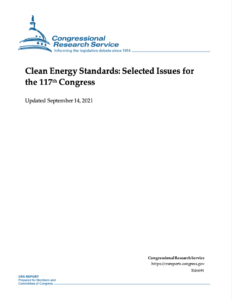Full Title: Clean Energy Standards: Selected Issues for the 117th Congress
Author(s): Ashley J. Lawson
Publisher(s): Congressional Research Service (CRS)
Publication Date: September 14, 2021
Full Text: Download Resource
Description (excerpt):
For many years, policies to reduce greenhouse gas (GHG) emissions have been of interest to Congress. Congressional and constituent interest continues in the 117th Congress. One option to reduce GHG emissions from electricity generation is a clean energy standard.
A clean energy standard (CES), sometimes called a clean electricity standard, is a policy that requires a minimum share of electricity to be generated from eligible “clean” sources. No universal definition of clean energy exists, and proposals differ in what technologies are included. Some proposals, usually referred to as a renewable portfolio standard (RPS), include only certain renewable energy sources(e.g., solar), while other proposals also include nuclear power, fossil fuels equipped with carbon capture and storage (CCS) technology, certain natural gas technologies, or other energy sources. As of 2020, thirty states and the District of Columbia have implemented a CES, including 10 jurisdictions that will ultimately require 100% of covered electricity sales to come from eligible clean energy sources. In addition, eight states have nonbinding goals of carbon–free electricity, and many utilities have committed to reducing their GHG emissions to varying degrees and over different time frames. State targets and utility goals cover 77%of total U.S. electricity sales, with 69% of total sales covered by a carbon–free target or goal.
